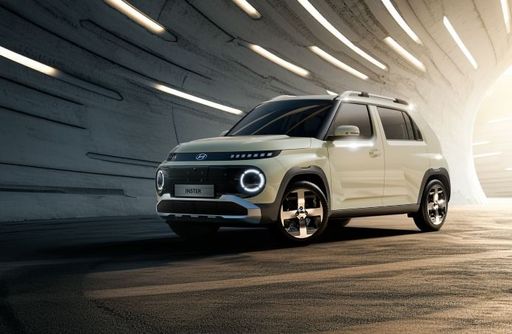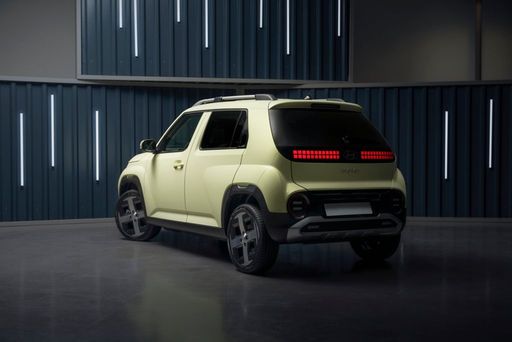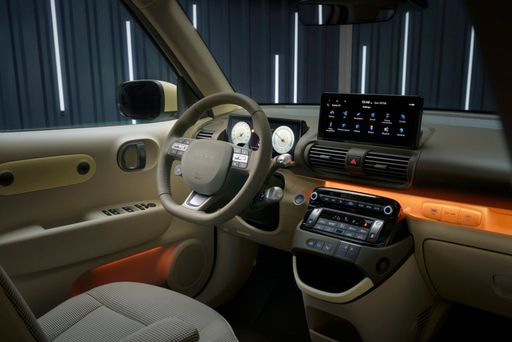VW Transporter Transporter VS Hyundai Inster – Specs, Efficiency & Price Comparison
Which model is the better choice – the VW Transporter Transporter or the Hyundai Inster? We compare performance (286 HP vs 115 HP), boot capacity ( vs 280 L), efficiency (21.90 kWh7.10 L vs 14.30 kWh), and of course, the price (37500 £ vs 20500 £).
Find out now which car fits your needs better!
The VW Transporter Transporter (Cargo Van) is powered by a Diesel, Plugin Hybrid or Electric engine and comes with a Manuel or Automatic transmission. In comparison, the Hyundai Inster (SUV) features a Electric engine and a Automatic gearbox.
When it comes to boot capacity, the VW Transporter Transporter offers , while the Hyundai Inster provides 280 L – depending on what matters most to you. If you’re looking for more power, you’ll need to decide whether the 286 HP of the VW Transporter Transporter or the 115 HP of the Hyundai Inster suits your needs better.
There are also differences in efficiency: 21.90 kWh7.10 L vs 14.30 kWh. In terms of price, the VW Transporter Transporter starts at 37500 £, while the Hyundai Inster is available from 20500 £.
Compare all the key specs now and find out which model fits your lifestyle best!
VW Transporter Transporter
The VW Transporter, a versatile favourite among commercial vehicles, combines practicality with modern design. Its spacious interior offers ample room for both passengers and cargo, making it a reliable choice for businesses and families alike. The vehicle's strong build and advanced technology ensure a smooth and efficient driving experience in various conditions.
detailsHyundai Inster
The Inster has quickly captured the attention of automotive enthusiasts with its striking design and dynamic performance. This model seamlessly blends advanced technology with comfort, making it an ideal choice for both daily commutes and adventurous road trips. With its spacious interior and innovative features, the Inster promises an exhilarating driving experience that doesn’t compromise on practicality.
details @ hyundai.news
@ hyundai.news
 @ hyundai.news
@ hyundai.news
 @ hyundai.news
@ hyundai.news

|
|
|
|
|
Costs and Consumption |
|
|---|---|
|
Price
37500 - 60800 £
|
Price
20500 - 25800 £
|
|
Consumption L/100km
7.1 - 8.4 L
|
Consumption L/100km
-
|
|
Consumption kWh/100km
21.9 - 24.4 kWh
|
Consumption kWh/100km
14.3 - 15.1 kWh
|
|
Electric Range
56 - 331 km
|
Electric Range
327 - 370 km
|
|
Battery Capacity
11.8 - 63.8 kWh
|
Battery Capacity
42 - 49 kWh
|
|
co2
0 - 220 g/km
|
co2
0 g/km
|
|
Fuel tank capacity
55 L
|
Fuel tank capacity
-
|
Dimensions and Body |
|
|---|---|
|
Body Type
Cargo Van
|
Body Type
SUV
|
|
Seats
2 - 5
|
Seats
4
|
|
Doors
4 - 5
|
Doors
5
|
|
Curb weight
1872 - 2462 kg
|
Curb weight
1380 - 1433 kg
|
|
Trunk capacity
-
|
Trunk capacity
238 - 280 L
|
|
Length
5050 - 5450 mm
|
Length
3825 - 3845 mm
|
|
Width
2032 mm
|
Width
1610 mm
|
|
Height
1966 - 1985 mm
|
Height
1575 - 1610 mm
|
|
Payload
755 - 1259 kg
|
Payload
317 - 357 kg
|
Engine and Performance |
|
|---|---|
|
Engine Type
Diesel, Plugin Hybrid, Electric
|
Engine Type
Electric
|
|
Transmission
Manuel, Automatic
|
Transmission
Automatic
|
|
Transmission Detail
Manual Gearbox, Automatic Gearbox
|
Transmission Detail
-
|
|
Drive Type
Front-Wheel Drive, All-Wheel Drive, Rear-Wheel Drive
|
Drive Type
Front-Wheel Drive
|
|
Power HP
110 - 286 HP
|
Power HP
97 - 115 HP
|
|
Acceleration 0-100km/h
7.4 - 16.9 s
|
Acceleration 0-100km/h
10.6 - 11.7 s
|
|
Max Speed
112 - 150 km/h
|
Max Speed
140 - 150 km/h
|
|
Torque
310 - 415 Nm
|
Torque
147 Nm
|
|
Number of Cylinders
4
|
Number of Cylinders
-
|
|
Power kW
81 - 210 kW
|
Power kW
71 - 85 kW
|
|
Engine capacity
1996 - 2488 cm3
|
Engine capacity
-
|
General |
|
|---|---|
|
Model Year
2025
|
Model Year
2025
|
|
CO2 Efficiency Class
G, A
|
CO2 Efficiency Class
A
|
|
Brand
VW
|
Brand
Hyundai
|
VW Transporter Transporter
Revolutionizing Utility: The VW Transporter T7
The latest iteration of the VW Transporter, known widely as the Transporter T7, marks a significant evolution in utility vehicle design and functionality. As a mainstay in the VW lineup, the Transporter T7 comes with a plethora of options, ensuring that it meets a variety of professional and personal needs.
Diverse Models to Fit Every Need
For 2025, the VW Transporter T7 is available in multiple configurations, ranging from efficient diesel engines to innovative hybrid systems. The conventional models are powered by a 2.0 TDI diesel engine, offering three power outputs: 110 HP, 150 HP, and a vigorous 204 HP. For those seeking a more sustainable option, the 2.5 eHybrid model provides a combined power output of 233 HP with an electric range of 56 km, thanks to its 11.8 kWh battery.
Innovative Technical Aspects
Underpinning the technical innovations of the Transporter T7 is VW's dedication to cutting-edge engineering. The diesel engines provide torque ranging from 310 Nm up to 390 Nm, ensuring robust performance across the lineup. Moreover, the T7 offers configurations with either manual or automatic gearboxes, catering to different driving preferences.
The availability of front-wheel drive and the 4MOTION all-wheel-drive system across the range enhances versatility, allowing the Transporter T7 to tackle various terrains with ease. With body lengths extending to 5450 mm and a payload capacity of up to 1259 kg, the Transporter T7 stands as a paragon of practicality for transporting goods or accommodating passengers.
Comfort and Design Revolution
Beyond performance, the VW Transporter T7 has been designed with driver comfort and ergonomic efficiency in mind. The cabins offer ample seating configurations, supporting both two-seat and five-seat layouts. The inclusion of modern conveniences elevates the driving experience, making long hauls more manageable and stress-free.
The exterior dimensions, with a width of 2032 mm and a height up to 1969 mm, marry the classic robust design with a contemporary touch, making the Transporter T7 a visual centerpiece in any fleet.
Economical and Environmental Impact
Economic efficiency is another critical aspect of the VW Transporter T7's design philosophy. With diesel fuel tank capacities between 55 and 63 liters, and an emphasis on improving mileage with each engine variant, operational costs are kept at a minimum. Additionally, the eHybrid model not only offers environmental benefits but also presents substantial savings on fuel through its electric range capability.
Conclusion: The Transporter T7 Legacy Continues
The VW Transporter T7 furthers the legacy of its predecessors by combining practicality, innovation, and eco-friendliness. Whether utilized for business in its cargo van capacity or adapted for personal use with seating comforts, the Transporter T7 is set to remain a critical player in the automotive sector, pushing the boundaries of what a multi-purpose van can achieve.
Hyundai Inster
The automotive landscape continues to evolve, and at the forefront of this transformation is the Hyundai Inster, a dynamic model set to impress electric vehicle enthusiasts. As a compact SUV, the Inster embodies a blend of innovative technology, user-friendly features, and an eco-conscious design, making it a contender in the burgeoning electric vehicle market.
Powertrain and Performance
The Hyundai Inster is powered by an efficient electric drivetrain, offering two main battery options: a 42 kWh and a 49 kWh version. These options translate to power outputs of 97 HP and 115 HP, respectively, allowing drivers to choose based on their performance needs. The Inster accelerates from 0 to 100 km/h in 11.7 seconds for the 42 kWh variant, while the more powerful 49 kWh model reaches the same speed in an impressive 10.6 seconds, showcasing Hyundai's commitment to delivering engaging performance.
Range and Efficiency
One of the standout features of the Inster is its electric range. The 42 kWh model provides a range of 327 km, while the 49 kWh variants extend the range to 360 km and 370 km. This remarkable efficiency is complemented by consumption figures of 14.3 kWh/100 km for the 42 kWh variant and 14.9 kWh/100 km for the 49 kWh options. These figures ensure that the Inster is not only suited for city driving but also capable of handling longer journeys with ease.
Dynamic Design and Comfortable Interior
Aesthetically, the Hyundai Inster boasts a sleek and modern look, featuring a compact SUV profile that is both sporty and practical. The dimensions, measuring between 3825 mm and 3845 mm in length, with a width of 1610 mm and heights ranging from 1575 mm to 1610 mm, contribute to its spacious and comfortable cabin. The interior accommodates up to four passengers, making it an ideal choice for small families or couples.
Innovative Features
The Inster incorporates advanced technology geared towards enhancing the driving experience. Its automatic transmission, utilizing a reduction gearbox, ensures seamless gear shifts. Additionally, drivers will appreciate the array of smart features designed for convenience and connectivity, including advanced infotainment systems and driver assistance technologies.
Sustainability Credentials
Hyundai is dedicated to sustainability, and the Inster is a testament to this philosophy. With a carbon footprint of zero emissions, the Inster falls into the A CO2 efficiency class, making it a responsible choice for eco-conscious consumers. The absence of traditional emissions positions the Inster not only as an economical option but also as a proactive step towards reducing our environmental impact.
Conclusion
The Hyundai Inster stands out as a versatile and innovative solution in the electric vehicle segment. With a balanced approach to performance, efficiency, and sustainability, it caters to the modern driver’s needs and reflects the automotive industry's shift towards electrification. The future looks bright for the Inster, as Hyundai continues to pave the way for greener driving experiences.
The prices and data displayed are estimates based on German list prices and may vary by country. This information is not legally binding.
